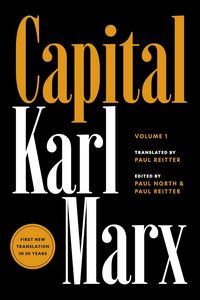Book reviews – Reitter, Monbiot/Hutchison, Potts
New translation of Das Kapital
 Capital. Critique of Political Economy, volume 1.
Capital. Critique of Political Economy, volume 1.
By Karl Marx. Translated by Paul Reitter. Princeton University Press. £24.50.
The fruit of five years’ work, Paul Reitter’s new translation of Das Kapital was published last month. It lives up to its claim to be a translation into colloquial (American) English, especially as regards the descriptive and historical parts. It really does read like something written this century as opposed to the now rather clunky original 1887 translation by Samuel Moore and Edward Aveling under Engels’s direction.
However, there are some words that cannot be said to be colloquial, in particular valorization, metabolize and subsumption which don’t appear in the 1887 translation and, in the case of the first two, could not have done. They first appeared in the 1976 Penguin translation by Ben Fowkes. Reitter has added a fourth — thingly. The 1887 version translates them as, respectively, ‘production of surplus value’, ‘material change (or circulation)’, and ‘subjection’. These are clearly more colloquial. As to thingly, this was translated as ‘material’, but most people will probably read it as ‘thingy’, which won’t be too wide of the mark.
Reitter has taken great care and there can be no doubt that his translations here are an accurate literal translation of the native German words, but, as with all translations, the question is who is the translation for. At one time Capital was read and studied in the working class movement. Now, unfortunately, it is read mainly by academics in the field of Marx studies. For them, such words present no problem and interpreting their meaning provides ample room for learned disputations, and, for those whose first language is English, puts them in a position to follow the arguments by those whose first language is German. Fair enough, but they don’t make it easier for ordinary working-class militants who want to understand how capitalism works and how they are exploited.
Metabolism is now acceptable and perhaps subsumption too but not valorization. It hardly existed in 1887 and is now used, in economics, to mean the same as ‘monetarization,’ making money out of something. Of course this is what capital is used for too but so are many other things that have nothing to do with workers being used to produce surplus value for capitalists (and all to do with putting a price on everything). The word ‘valorization’ blunts, even obscures, that what’s involved is the exploitation of workers.
For example, in Reitter’s (and Fowkes’s) translation, the title of the chapter which introduces the concept of surplus value is ‘The Labor Process and the Valorization Process’. In the 1887 translation it’s ‘The Labour Process and the Process of Producing Surplus Value’. Further, even of itself, ‘valorization’ doesn’t bring out in a clear and immediately comprehensible way what Marx was getting at. The 1887 translation defines capital as ‘self-expanding value’, which conveys the idea of capitalist production as a spontaneous process of producing surplus value. For Reitter, it is ‘self-valorizing value’. Thus, Reitter’s ‘capital’s life process is nothing but its own movement as self-valorizing value’ (p. 280) compares unfavourably, in terms of easier understanding, with 1887’s ‘the life-process of capital consists only in its movement as value constantly expanding, constantly multiplying itself’ (end of the chapter on ‘The Rate and the Mass of Surplus-Value’).
This is not to dismiss the usefulness of Reitter’s work. Not at all. You just need to read ‘expansion of value’ every time the words ‘valorization’ or ‘valorize’ occur. His translation reads well and is accompanied by 50 pages of very useful end-notes to explain his choice of words as well as Marx’s citations (in Latin, Greek, French and Italian) and references to now obscure persons. It will stand the test of time and can be recommended for those who want to read in modern English Marx’s own exposition of his abstract-labour theory of value and his description, from a working-class point of view, of how the working class in England came into being, its working and living conditions in and up to the 1860s, and struggles to limit the working day.
It is unfortunate that the publishers haven’t let readers simply read Marx in his own words. Instead they have chosen to introduce the new translation with both a 15-page Foreword and a 30-page Editor’s Introduction, both claiming to set out what Marx meant. Both are decidedly unhelpful and undermine the rest of the book. The Preface is mainly gibberish by someone who dismisses as ‘fantasy’ what she calls ‘a perfectly rational, controlled and transparent communist political economy on the far side of a capitalist epoch’; according to her, Capital is a work of philosophy, a ‘deep ontological and epistemological critique of capitalism’. The Editor, too, sees Marx as basically a philosopher and opines that in Capital ‘nowhere really does Marx condemn the capital system or call for revolution’. But, then, both of them are philosophers who only want to interpret the world.
Reitter’s translation is of the 2nd German edition (1873), the 1887 translation is of the 3rd German edition (1883) while Fowkes’s was of the 4th German edition (1890). So now all three German re-editions are available in English. Not that there is any significant difference between them. One inconvenience, though, is that the chapter numbers in Reitter’s translation don’t always correspond to those in the other two which readers in English of Marx have become used to.
ALB
 The Invisible Doctrine: The Secret History of Neoliberalism (& How It Came to Control Your Life). By George Monbiot & Peter Hutchison (Allen Lane)
The Invisible Doctrine: The Secret History of Neoliberalism (& How It Came to Control Your Life). By George Monbiot & Peter Hutchison (Allen Lane)
This small book embraces some pretty big ideas, of interest to socialists. It’s a collaboration between US radical filmmaker Peter Hutchison (whose past work ranges from Iron Man to the Noam Chomsky documentary Requiem for the American Dream) and journalist George Monbiot. Monbiot’s trajectory is also of interest for socialists. From run-of-the-mill environmental reform campaigner in the 1990s his writings over the last 20 years detail a growing revolutionary political consciousness.
The objective of the book is to shed light on the significant political changes – ‘capitalism on steroids’ as the authors put it – that have occurred in the last 50 years and understand the extent to which these are predictable consequences of a concerted ideological offensive by the ruling class.
The book traces the intellectual origins of neoliberalism back to Hayek and von Mises. These ideas (privatization, cut taxes, deregulation etc) originally confined to academia were nurtured, funded and propagated by US business interests. (Monbiot has previously done much to shed light on the murky business origins of all the impressive-sounding institutes, thinktanks and lobbyists that actively try and manage political debate).
The authors make an attempt to argue that neoliberalism is distinct from classical laissez-faire liberalism, in that it emphasizes economic freedoms but pays less attention to the philosophical liberties of the individual that are usually bundled in. Adam Smith may have felt it necessary to expound on the benefits to society of the ‘invisible hand’; in contrast neoliberals don’t really care what the consequences are – the free market is the objective. For our part we have to be hopeful that workers increasingly see an invisible hand that gives them a very visible ‘two-fingers’. I’m not sure whether neoliberalism merits its own chapter in any political history of exploitation and oppression, but socialists would perhaps see it as a more honest philosophical rationale for capitalism. Either way the authors don’t get lost in the angels-on-pins philosophy, and are pretty explicit: ‘Neoliberalism is class war’.
The authors argue that neoliberalism’s disdain for anything beyond the market means that democracy is being degraded globally. We used to be told that capitalism and democracy were ideologically intertwined in a glorious revolutionary project. That was nonsense of course (the vote was just a necessary concession made by capitalists to keep workers on-side) but nevertheless democracy is a pretty heavyweight argument, one worth trying to have on your side. Harder to argue though in an era when free-market ideology appears to travel hand-in-hand with openly authoritarian demagogues; the recent Elon Musk/Donald Trump interview is a clear example (but perhaps not so much ‘hand-in-hand‘ as just two hours of mutual rimming – apologies to Socialist Standard readers for the mental image invoked).
World socialists are arguably unique as a political movement in how explicit we are in our confidence in the capacity of our species to understand the world we live in (given a chance) and act in our collective interests to create a democratic, participative and conscious revolution. We are therefore very interested in the spread of political ideas, including pro-capitalist ones. The ideas of von Mises and Hayek have clearly had impact. It helps to have a billionaires’ blank cheque of course, but the story of neoliberalism lends strength to the argument that ideas, particularly if they can be framed in a coherent narrative, actually matter. The unopposed march of neoliberal ideas has partly been because the left has been unable to adequately create its own narrative. World socialists would argue that this is because so much of the left are in denial; deep-down they are actually wedded to capitalism.
Many supposedly ‘anti-capitalist’ books end with a whimper as the author provides a list of reforms, a mild wish list. Monbiot and Hutchison end their book more substantially, suggesting the potential for some sort of alternative narrative, a ‘politics of belonging’. This involves acknowledging the remaining non-market commons around us that we share, and interesting concepts such as private sufficiency/public luxury are discussed that should be of interest to world socialists. There are glimpses of how this may be pre-figured and developed within the capitalist state (a contentious point for most world socialists) but don’t let this put you off. In the final chapter the authors make a strong and refreshing argument, that every world socialist will echo, against reformism:
‘Far from being a shortcut to the change we want to see, it is the morass into which ambition sinks. System change as the neoliberals and the new demagogues have proven is, and has always been, the only fast and effective means of transformation’.
B. G.
Country Lives
 The Forgotten Girls: a Memoir of Friendship and Lost Promise in Rural America. By Monica Potts. Penguin £10.99.
The Forgotten Girls: a Memoir of Friendship and Lost Promise in Rural America. By Monica Potts. Penguin £10.99.
The author was born and brought up in the small town of Clinton in Arkansas. Her book has two main themes: life, especially for women, in an isolated area, and the story of her friend Darci.
Like much of the rural US, Clinton has social and economic problems, made worse by the 2007–8 crash. Services such as schools and post offices are closing, industries are leaving, and poor white people – women, especially – are dying younger than a generation ago. Clinton is part of the Bible Belt, and evangelical churches are very powerful. There are high rates of sexual abuse and childhood trauma, and women in particular are discriminated against. ‘The church set girls up to be of service to everyone and in charge of nothing’ and ‘Women were held morally responsible for everything that happened in their families and communities. They were supposed to sacrifice everything for their children, even their own happiness and mental health.’ They find it hard to imagine a single life and are expected to do what their husbands tell them. There is a high rate of teenage births, and what sex education there is emphasises abstinence. The area is very conservative, is strongly anti-abortion and supports Trump.
Potts was, partly by chance, able to move away, attend college and become a journalist, though she later moved back to Clinton with her partner. Darci, however, was not so lucky. She lost her virginity at fourteen (to an eighteen-year-old); another local girl got married at fifteen, to a man nine years older. By the age of sixteen, Darci had a live-in boyfriend. She had some talent as a musician and played at music festivals, but drug-taking meant she missed so much attendance that she was unable to graduate from high school. She was emotionally and physically abused by partners, and had two children in her twenties. She stole smallish sums from an employer, but this eventually totalled $13,000, and she was sentenced to probation. Various jail spells followed drug charges and violating probation.
One of Potts’ cousins says to her: ‘Can you imagine waking up in your life, at thirty-five, and realising you have nothing?’ This aptly characterises the lives of Darci and people (not just women) like her: they are depressed, break the law in various ways, go to jail, are released, but then the cycle starts again. Poor white people are badly off, but feel that at least they are not black and at the bottom of the ‘rigid racial hierarchy’.
This is a vivid account of working-class life in some of the poorest parts of the US, and a reminder of how capitalism treats so many people in the ‘land of the free’.
PB
Next article: 50 Years Ago – Confucius, Lin Piao and the CCP ⮞
